| Listing 1 - 10 of 6743 | << page >> |
Sort by
|
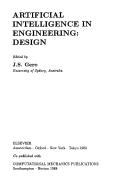
ISBN: 0444704663 Year: 1988 Publisher: Amsterdam Oxford New York Southampton Boston Elsevier Computational Mechanics Publications
Abstract | Keywords | Export | Availability | Bookmark
 Loading...
Loading...Choose an application
- Reference Manager
- EndNote
- RefWorks (Direct export to RefWorks)
AI(Artificial intelligence) --- Artificial intelligence --- Artificial thinking --- Artificiële intelligentie --- Electronic brains --- Intellectronics --- Intelligence [Artificial ] --- Intelligence artificielle --- Intelligent machines --- Kunstmatige intelligentie --- Machine intelligence --- Thinking [Artificial ] --- Engineering --- Congresses. --- Data processing --- Cerveaux électroniques --- Machines intelligentes --- Pensée artificielle
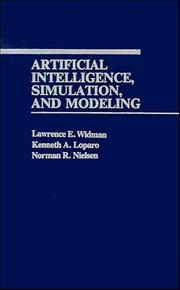
ISBN: 0471605999 9780471605997 Year: 1989 Publisher: New York Chichester Toronto Wiley
Abstract | Keywords | Export | Availability | Bookmark
 Loading...
Loading...Choose an application
- Reference Manager
- EndNote
- RefWorks (Direct export to RefWorks)
AI(Artificial intelligence) --- Artificial intelligence --- Artificial thinking --- Artificiële intelligentie --- Computer simulation --- Computersimulatie --- Electronic brains --- Intellectronics --- Intelligence [Artificial ] --- Intelligence artificielle --- Intelligent machines --- Kunstmatige intelligentie --- Machine intelligence --- Simulation par ordinateur --- Thinking [Artificial ] --- Artificial intelligence. --- Computer simulation. --- Cerveaux électroniques --- Machines intelligentes --- Pensée artificielle
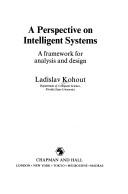
ISBN: 0412379309 Year: 1990 Volume: vol *8 Publisher: London New York Madras Chapman and Hall
Abstract | Keywords | Export | Availability | Bookmark
 Loading...
Loading...Choose an application
- Reference Manager
- EndNote
- RefWorks (Direct export to RefWorks)
AI(Artificial intelligence) --- Artificial intelligence --- Artificial thinking --- Artificiële intelligentie --- Electronic brains --- Intellectronics --- Intelligence [Artificial ] --- Intelligence artificielle --- Intelligent machines --- Kunstmatige intelligentie --- Machine intelligence --- Thinking [Artificial ] --- Cerveaux électroniques --- Machines intelligentes --- Pensée artificielle
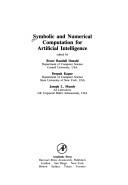
ISBN: 0122205359 Year: 1992 Volume: vol *7 Publisher: London ; San Diego ; New York Academic Press
Abstract | Keywords | Export | Availability | Bookmark
 Loading...
Loading...Choose an application
- Reference Manager
- EndNote
- RefWorks (Direct export to RefWorks)
AI(Artificial intelligence) --- Artificial intelligence --- Artificial thinking --- Artificiële intelligentie --- Calculs numériques --- Electronic brains --- Intellectronics --- Intelligence [Artificial ] --- Intelligence artificielle --- Intelligent machines --- Kunstmatige intelligentie --- Machine intelligence --- Numerical calculations --- Numerieke berekeningen --- Thinking [Artificial ] --- Congresses. --- Cerveaux électroniques --- Machines intelligentes --- Pensée artificielle --- Mathematical models
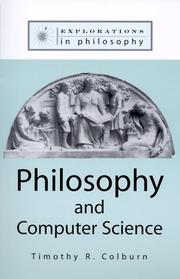
ISBN: 156324991X Year: 1999 Volume: *1 Publisher: Armonk, N. Y. London M. E. Sharpe
Abstract | Keywords | Export | Availability | Bookmark
 Loading...
Loading...Choose an application
- Reference Manager
- EndNote
- RefWorks (Direct export to RefWorks)
AI(Artificial intelligence) --- Artificial intelligence --- Artificial thinking --- Artificiële intelligentie --- Cerveaux électroniques --- Electronic brains --- Intellectronics --- Intelligence [Artificial ] --- Intelligence artificielle --- Intelligent machines --- Kunstmatige intelligentie --- Machine intelligence --- Machines intelligentes --- Pensée artificielle --- Thinking [Artificial ] --- Artificial intelligence. --- Computer science --- Philosophy. --- Philosophy --- Artificial intelligency.
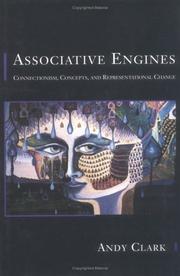
ISBN: 0262032104 0262513773 0585023387 0262270420 9780262270427 9780585023380 9780262032100 Year: 1993 Publisher: Cambridge, Mass. : MIT Press,
Abstract | Keywords | Export | Availability | Bookmark
 Loading...
Loading...Choose an application
- Reference Manager
- EndNote
- RefWorks (Direct export to RefWorks)
Connectionist approaches, Andy Clark argues, are driving cognitive science toward a radical reconception of its explanatory endeavor. At the heart of this reconception lies a shift toward a new and more deeply developmental vision of the mind - a vision that has important implications for the philosophical and psychological understanding of the nature of concepts, of mental causation, and of representational change.Combining philosophical argument, empirical results, and interdisciplinary speculations, Clark charts a fundamental shift from a static, inner-code-oriented conception of the subject matter of cognitive science to a more dynamic, developmentally rich, process-oriented view. Clark argues that this shift makes itself felt in two main ways. First, structured representations are seen as the products of temporally extended cognitive activity and not as the representational bedrock (an innate symbol system or language of thought) upon which all learning is based. Second, the relation between thoughts (as described by folk psychology) and inner computational states is loosened as a result of the fragmented and distributed nature of the connectionist representation of concepts. Other issues Clark raises include the nature of innate knowledge, the conceptual commitments of folk psychology, and the use and abuse of higher-level analyses of connectionist networks. Andy Clark is Reader in Philosophy of Cognitive Sciences in the School of Cognitive and Computing Sciences at the University of Sussex, in England. He's the author of Microcognition: Philosophy, Cognitive Science, and Parallel Distributed Processing.
Cognitive psychology --- Artificial intelligence. Robotics. Simulation. Graphics --- AI(Artificial intelligence) --- Artificial intelligence --- Artificial thinking --- Artificiële intelligentie --- Cognitie --- Cognition --- Connectionism --- Connectionisme --- Connectionnisme --- Connexionism --- Electronic brains --- Intellectronics --- Intelligence [Artificial ] --- Intelligence artificielle --- Intelligent machines --- Kunstmatige intelligentie --- Machine intelligence --- Thinking [Artificial ] --- Psychology --- AI (Artificial intelligence) --- Intelligence, Artificial --- Thinking, Artificial --- Bionics --- Cognitive science --- Digital computer simulation --- Electronic data processing --- Logic machines --- Machine theory --- Self-organizing systems --- Simulation methods --- Fifth generation computers --- Neural computers --- Artificial intelligence. --- Cognition. --- Connectionism. --- Cerveaux électroniques --- Machines intelligentes --- Pensée artificielle --- E-books
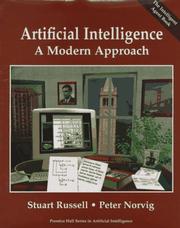
ISBN: 0131038052 0133601242 9780133601244 9780131038059 Year: 1995 Volume: *1 Publisher: Englewood Cliffs, N.J. Prentice Hall
Abstract | Keywords | Export | Availability | Bookmark
 Loading...
Loading...Choose an application
- Reference Manager
- EndNote
- RefWorks (Direct export to RefWorks)
Artificial intelligence. Robotics. Simulation. Graphics --- AI(Artificial intelligence) --- Artificial intelligence --- Artificial thinking --- Artificiële intelligentie --- Electronic brains --- Intellectronics --- Intelligence [Artificial ] --- Intelligence artificielle --- Intelligent machines --- Kunstmatige intelligentie --- Machine intelligence --- Thinking [Artificial ] --- 681.3*I2 --- Artificial intelligence. AI --- Artificial intelligence. --- 681.3*I2 Artificial intelligence. AI --- Cerveaux électroniques --- Machines intelligentes --- Pensée artificielle --- AI (Artificial intelligence) --- Intelligence, Artificial --- Thinking, Artificial --- Bionics --- Cognitive science --- Digital computer simulation --- Electronic data processing --- Logic machines --- Machine theory --- Self-organizing systems --- Simulation methods --- Fifth generation computers --- Neural computers
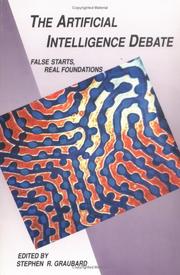
ISBN: 0262570742 9780262570749 Year: 1988 Publisher: Cambridge: MIT Press,
Abstract | Keywords | Export | Availability | Bookmark
 Loading...
Loading...Choose an application
- Reference Manager
- EndNote
- RefWorks (Direct export to RefWorks)
AI(Artificial intelligence) --- Apprentissage automatique --- Artificial intelligence --- Artificial thinking --- Artificiële intelligentie --- Automatisch aanleren --- Cerveaux électroniques --- Electronic brains --- Intellectronics --- Intelligence [Artificial ] --- Intelligence artificielle --- Intelligent machines --- Kunstmatige intelligentie --- Learning [Machine ] --- Machine intelligence --- Machine learning --- Machines intelligentes --- Pensée artificielle --- Thinking [Artificial ] --- Learning, Machine --- Machine theory --- AI (Artificial intelligence) --- Intelligence, Artificial --- Thinking, Artificial --- Bionics --- Cognitive science --- Digital computer simulation --- Electronic data processing --- Logic machines --- Self-organizing systems --- Simulation methods --- Fifth generation computers --- Neural computers --- Artificial intelligence. --- Machine Learning --- Machine learning. --- Systèmes, Conception de --- System design

ISBN: 0521359449 0521351030 0511663110 0511873956 9780521359443 9780521351034 Year: 1990 Publisher: Cambridge : Cambridge University Press,
Abstract | Keywords | Export | Availability | Bookmark
 Loading...
Loading...Choose an application
- Reference Manager
- EndNote
- RefWorks (Direct export to RefWorks)
This outstanding collection is designed to address the fundamental issues and principles underlying the task of Artificial Intelligence. The editors have selected not only papers now recognized as classics but also many specially commissioned papers which examine the methodological and theoretical foundations of the discipline from a wide variety of perspectives: computer science and software engineering, cognitive psychology, philosophy, formal logic and linguistics. Carefully planned and structured, the volume tackles many of the contentious questions of immediate concern to AI researchers and interested observers. Is Artificial Intelligence in fact a discipline, or is it simply part of computer science? What is the role of programs in AI and how do they relate to theories? What is the nature of representation and implementation, and how should the challenge of connectionism be viewed? Can AI be characterized as an empirical science? The comprehensiveness of this collection is further enhanced by the full, annotated bibliography. All readers who want to consider what Artificial Intelligence really is will find this sourcebook invaluable, and the editors will undoubtedly succeed in their secondary aim of stimulating a lively and continuing debate.
Artificial intelligence. Robotics. Simulation. Graphics --- AI(Artificial intelligence) --- Artificial intelligence --- Artificial thinking --- Artificiële intelligentie --- Electronic brains --- Intellectronics --- Intelligence [Artificial ] --- Intelligence artificielle --- Intelligent machines --- Kunstmatige intelligentie --- Machine intelligence --- Thinking [Artificial ] --- #KVIV:BB --- 681.3*I20 --- Artificial intelligence (AI) in general; cognitive simulation; philosophical foundations --- 681.3*I20 Artificial intelligence (AI) in general; cognitive simulation; philosophical foundations --- Cerveaux électroniques --- Machines intelligentes --- Pensée artificielle --- AI (Artificial intelligence) --- Intelligence, Artificial --- Thinking, Artificial --- Bionics --- Cognitive science --- Digital computer simulation --- Electronic data processing --- Logic machines --- Machine theory --- Self-organizing systems --- Simulation methods --- Fifth generation computers --- Neural computers --- Artificial intelligence. --- Information Technology --- Computer Science (Hardware & Networks)

ISBN: 0442805012 Year: 1979 Publisher: New York (N.Y.): Van Nostrand
Abstract | Keywords | Export | Availability | Bookmark
 Loading...
Loading...Choose an application
- Reference Manager
- EndNote
- RefWorks (Direct export to RefWorks)
Artificial intelligence. Robotics. Simulation. Graphics --- 159.95*1 --- Artificial intelligence --- -Artificial intelligence --- -AI (Artificial intelligence) --- Artificial thinking --- Electronic brains --- Intellectronics --- Intelligence, Artificial --- Intelligent machines --- Machine intelligence --- Thinking, Artificial --- Bionics --- Cognitive science --- Digital computer simulation --- Electronic data processing --- Logic machines --- Machine theory --- Self-organizing systems --- Simulation methods --- Fifth generation computers --- Neural computers --- Cognitieve psychologie --- Data processing --- -Problems, exercises, etc --- Computer programs --- Problems, exercises, etc. --- -Cognitieve psychologie --- 159.95*1 Cognitieve psychologie --- -159.95*1 Cognitieve psychologie --- AI (Artificial intelligence) --- Computer programs&delete& --- Problems, exercises, etc --- Data processing&delete& --- Computer programs&delete&&delete& --- Data processing&delete&&delete&
| Listing 1 - 10 of 6743 | << page >> |
Sort by
|

 Search
Search Feedback
Feedback About
About Help
Help News
News